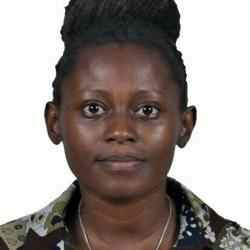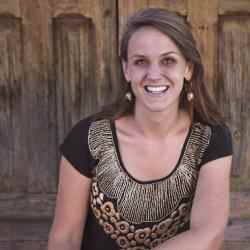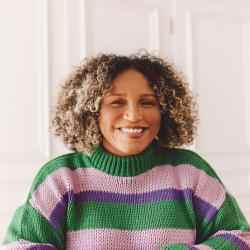Introduction
Rossana Dewi helps rural women become capable decision-makers and leaders in agricultural production. She does this by teaching women farmers valuable skills that enable them to become researchers and teachers capable of finding solutions to serious agricultural problems through action-oriented research.
The New Idea
Rossana sees that the success of sustainable agriculture depends largely on the development and training of local people. Further, she sees that women can play important leadership roles in agricultural development and production. Through a curriculum offered through a network of field learning centers, Rossana is helping rural women see opportunities and learn the skills they need to pursue them. By mastering practices in sustainable agriculture, the women also rise to a new role in their families and communities. The impact is substantial: women make more money by increasing crop yields through planning and better techniques; they reduce operating expenses by producing their own seeds; and they use fewer chemical fertilizers. In addition, the women gain the self-confidence that allows them to assert themselves in other spheres of life. From Rossana's learning centers, farmers move on to form groups and organizations that devise and lobby for government policies that offer greater opportunities to small-scale farmers.
The Problem
The developments in agriculture that began in Indonesia in the 1960s occurred in the context of fulfilling the food needs of the country. One solution offered by developed nations was "super seeds" that produced crops in a shorter period of time; the consequence was an increased need for chemical fertilizers and pesticides. Reliance on farm machinery was also promoted, namely, use of tractors, spraying machines, and mechanical threshers. Dams were built along with irrigation canals and village roads, all with the goal of supporting crop production. This model of development came to be known as the Green Revolution. Within a period of 20 years, food crop production, especially rice, was able to satisfy the country's needs, and in 1987 Indonesia received an FAO award as a country that had evolved from a rice importer to one self-sufficient in rice production. Between the 1970s and mid-1980s, the Indonesian economy was weak and the need for food great. In addition, the World Bank and other international monetary organizations offered soft loans for agricultural development. These loans were given for the production of seed, fertilizer, pesticides, and even tools and equipment from multinational companies to be sold to farmers. Because of the need to add ever-increasing amounts of chemical input to maintain production, the environment suffered soil degradation and water pollution.
Policies of the Indonesian government do not support poor farmers. Rather than an increase in farmers' incomes, production targets are the main priority. Farmers are treated as objects for increasing production–agents acting as safety buffers for national food security–so that consumers can buy food at low cost.
Many of the cultural systems in Indonesia tend to be dominated by men. As a consequence, for women, economic, social, environmental and political access is often limited. At first glance, the gender inequality in the middle and lower classes is not obvious. Women and men work together in the community. However, in decision-making, it is clear that women's interests fail to be adequately represented, both at the family and the community level. Because of women's limited access to information and skill development, the society assumes that men can best represent their interests. The result is that women are often not involved in decision-making.
The Green Revolution only strengthened men's dominant position. Agricultural work that had been performed by women, like rice harvesting, was taken over by men. Because farmers' groups and training programs were aimed largely at male farmers farming rice, women found themselves more limited in their sources of information. Today, women continue to lack information, and they are often unable to contribute to or fulfill their families' needs for basic things like school fees, healthcare, household goods, and recreation. In Indonesia this problem is further amplified by urbanization. While this phenomenon can involve both men and women migrating, it is especially common in rural Java, for example, for men to leave their wives and families in the village to seek employment in urban centers. The men tend to return every few months to share their income and make decisions about how to run the farm.
The Strategy
Rossana uses an affirmative action approach to provide farming women with a collaborative, learning environment based on skill development, research, case studies, and practical experience. Rossana and her team at the organization Gita Pertiwi go door to door to meet women farmers. They encourage their participation by gearing the times and location of learning activities to suit the women's busy schedules. The learning process emphasizes discussion and a participatory approach that involves the women in developing plans and solving problems together. Information is gathered until a solution and plan of action have been drafted. The difference compared with traditional field schools is that Rossana's learning program is designed to meet student needs, addressing problems that they are facing, as well as accommodating their busy schedules at home. Women typically study in a field school format for two or three planting seasons. Fieldwork is done in groups or individually on a weekly basis. Each farmer who takes part in the field school is expected to train two additional farmers who have plots or work in fields nearby. The learning materials begin with technical aspects and move on to social and political matters. Students examine a variety of active, participatory methods and cover gender analysis, decision-making, and analysis of agricultural policies. Rossana and her team take the role of facilitators to help guide discussions and problem-solving.
Other aspects of the learning process involve research that the women themselves undertake in their own groups. If required, assistance from outside sources, agronomists, pest (or other) experts is provided. Completed research that yields positive results can be retested and spread to other farmers. One field school learning center focused on the production of peanut plants and the specific problems of their pests, diseases, and peanut seed selection. The research resulted in a production increase of 45 percent. Another learning center decided to tackle the problem of the uret, a particularly damaging beetle larvae. The farmer researchers were given the opportunity to visit university labs throughout Java where all the experts proposed to solve the problem with ineffective chemical pesticides. The learning center researchers stayed up at night for weeks to understand the patterns of the uret. Ultimately, they found a solution that involved farmers trapping the beetles before they could lay their eggs, thus breaking the development cycle. This approach has been tested in several locations, proven successful, and has been documented by farmers themselves in illustrated booklets.
Other field school learning centers have focused on animal husbandry and issues of artificial insemination, rice production, seed selection and cultivation, soybeans, koro-koro (local beans, both planting and postharvest production), pests specific to soybeans, and the development of natural bacteria starters for organic fertilizers.
In further support of their work, farmers are given the opportunity and training to make learning materials that document and promote their research to other farmers. They have created insect gardens, collections of dried pests, various herbarium, diagrams, maps, photos, and brochures. Farmer-initiated innovations have also been documented on VCDs, and Rossana has arranged for the farmers to present their findings at universities.
Following a harvest and completion of a learning program, between 75 and 150 farmers come together in farmer forums to share their information and make presentations. At least 10 farmer organizations have been established from collaborations at these forums. Organizing at the field and ecosystem level has helped communities work together and has had a positive impact on the democratization process at the village level. Women from these groups have been elected to their village councils; one woman is a candidate for the head of her village.
One of Rossana's strategies is always to involve representatives from farmer organizations in larger networks so as to provide them the opportunity to speak at seminars and public events, both nationally and internationally. As an active leader for many relevant issues and organizations, Rossana has helped influence national policy change throughout Indonesia.
Rossana began to develop her field school learning approach in 1992 when she was a volunteer field worker for Gita Pertiwi in a village near Wonogiri, Central Java. In 1994 she began to spread the idea to neighboring areas at the request of the women farmers there. More and more requests began to flow in. Feeling quite overwhelmed, Rossana decided to try to increase the staff for the program by involving farmers themselves as trainers. The groups nominate from their members those that they consider to be potential trainers and facilitators. Those selected are trained and serve as apprentices to facilitators from Gita Petiwi for one planting season. Afterwards, they are offered a one-year contract. After the year the farmers groups conduct an evaluation of the facilitators. More than 50 farmer facilitators have been trained so far.
More than 5,000 farmers in four districts (kabupaten) in Central Java, East Java, and Yogyakarta have been given the opportunity to participate directly in the learning programs. The model has been adopted by eight other organizations in other districts in Java (Pacitan, Gunung Kidul, and Malang), as well as in other provinces, including East Nusa Tenggara, West Nusa Tenggara, West Kalimantan, and Lampung. Staff from these organizations apprentice with Gita Pertiwi for at least one planting season, and Rossana, her staff, and farmer facilitators also visit and evaluate programs that have adopted their model.
The Person
Rossana was born and raised in Surakarta (Solo) in Central Java where her mother's family owned a batik business and her father worked in construction. Her family was strict and traditional. Rossana felt a sense of injustice in the way that she and her sister were treated differently from their brothers. She was rebellious, but she felt that her mother supported her and provided a role model of a strong and independent woman. Rossana wanted to be a teacher like her grandfather and was disappointed when she failed to be accepted at the teacher training college. However, she did pass into the agricultural faculty of UNS and was inspired by her grandfather who told her that teaching can be done in any setting and that nonformal education is just as valuable. From her family's batik business, Rossana felt a strong connection with rural women. When she was a child, more than 100 women workers from villages around Solo lived and worked in her family home. These women lost their jobs when the family business and most other small batik businesses went bankrupt in the mid-1970s, following the establishment of modern batik factories. Rossana and her mother kept their ties with the women by visiting their villages and helping them sell their products in the city. Because of the family's economic troubles, Rossana had to help support herself through her university studies, but she still found time to be active in organizations and a leader in student groups.
In 1992, as an agricultural engineering graduate, Rossana began to develop her ideas for sustainable agriculture while serving as a volunteer field worker for Gita Pertiwi in a village near Wonogiri, Central Java. At first she worked with existing farmer groups to introduce her early field school ideas. After evaluating the impact after two years, she found that no significant gains had been realized for the farmers. She conducted a case study survey on the impact of training on farmers' households and discovered that male farmers tended to keep the information they gained for themselves, while women shared with the husbands and children and tended to be more enthusiastic to implement the new knowledge in their fields. For Rossana this meant that by focusing on women farmers, it would be possible to have a more significant impact and provide women with an opportunity to create change in their lives.



